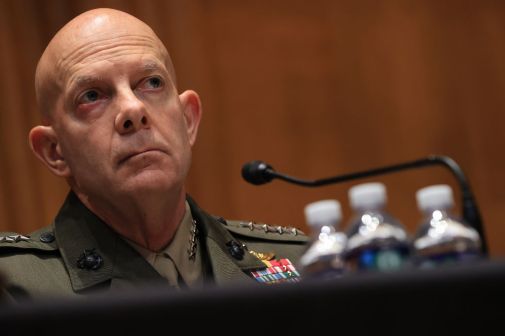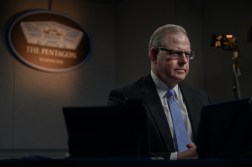Marines double down on Corps’ own IT network, punting DOD’s plans for all-services cloud
The Marine Corps will concentrate on finishing the build out of its own centralized IT network, putting on the back-burner its participation in the Defense Department’s mandatory all-services computer cloud called the Joint Information Environment, the Corps’ CIO said Friday.
The Corps wants to continue work on a single network that empowers the warfighter on the battlefield as well as domestic operations and specifically meets the needs of Marines, the Corps’ Chief Information Officer Brig. Gen. Dennis Crall, said during his first public appearance since taking the role in July.
“It’s not about what happens at the flagpole, it’s about what happens in the fight hole, which is why our network is being built differently than every other [military] service,” Crall, who also serves as the Marine Corps director of command, control, communications and computers, or C4, said at an AFCEA Nova lunch in Tysons Corner, Virginia.
The Seamless Marine Corps Enterprise Network, or MCEN, the formal title for the centralized network that Crall touted as the only of its kind across the branches of military, is rooted in the principles of information command and control, he said. It’s “a network that is live in garrison, moves with us, is mature, scalable and then returns back to that shape.” Described as the Corps’ “network‐of‐networks,” it “provides robust, seamless and secure end‐to‐end communications – from the supporting establishment to our forward deployed forces,” according to a fact sheet, and it’s the Marines’ biggest C4 focus right now, he said.
“It’s the idea that you have one network; one network that operates and extends, not from the flagpole to the fighting hole, but from the fighting hole backward,” Crall said.
When times of conflict arise, he added, the Marines’ role is “about arriving on objective and being ready to fight immediately — instantly.”
Though the Marine Corps, like the other branches of military and defense agencies, is tasked by the DOD to integrate into the Joint Information Environment, Crall said his branch must focus on its own needs first.
“When you look at how the Joint Information Environment is unfolding right now, it’s unfolding as something kind of grand with some promises in the future about where it ends up,” he said. “The Marine Corps can’t take that pace. We have to have those assurances up front, take that decision-making enabler, and get it in the hands of the warfighter in the most austere conditions imaginable.”
Crall clarified that the Marine Corps is still on board with the JIE. “But it has to meet the needs of the Marine Corps. And we’re fighting very diligently to ensure that those needs are” taken into account, he said.
Summing up the Corps’ attitude to its participation in the JIE in the long term, Crall called it a “definite maybe.”
But until then, he said, MCEN is the focus. “For the Marine Corps, we’re all in — one network to serve the way in which we do business.”






